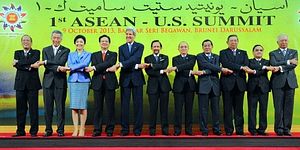The Association of Southeast Asian Nations (ASEAN) has once again stood paralyzed in the face of Chinese assertiveness in the South China Sea.
As my colleague Shannon discussed on China Power, and Ankit and myself talked about on the podcast this week, the 10 ASEAN member states failed to take a united stance on the issue at the summit in Myanmar over the weekend.
The crux of the issue hasn’t changed since at least the 2012 ASEAN summit, which ended without a communique for the first time ever due to disagreements on the South China Sea. Namely, only four ASEAN member states — the Philippines, Vietnam, Brunei and Malaysia (and possibly now Indonesia) — have ongoing territorial disputes with China (and Taiwan) over the South China Sea.
Meanwhile, China remains ASEAN’s largest trading partner and the largest trading member of many of its member states. Thus, many of the member states without a direct stake in the South China Sea maritime disputes are opposed to antagonizing China for an issue that in their view doesn’t concern them. This suits China well, as Beijing has long argued that the maritime disputes should be discussed on a bilateral basis where its influence over its much smaller neighbors is greatest.
Although efforts to forge a united ASEAN position should continue, the claimant states must acknowledge that they may not get the rest of the multilateral body on board with their position to present a unified front towards China. After all, unless Beijing enters into a prolonged economic stagnation, its influence over ASEAN is likely to grow in the years and decades ahead as its consumer market expands and initiatives like the Silk Road Economic Belt and Maritime Silk Road begin to bear fruit.
That doesn’t mean that the Southeast Asian claimants to the South China Sea should stand idle as China becomes more forceful in asserting its claims to the disputed waters. Indeed, one of the strongest moves they can make doesn’t require the participation of the rest of ASEAN.
Namely, the Philippines, Vietnam, Brunei and Malaysia should enter into multilateral negotiations aimed at resolving all outstanding territorial disputes amongst themselves. Although China’s (and Taiwan’s) enormous claims of sovereignty over 90 percent of the South China Sea puts it front and center in the maritime disputes, the four ASEAN states have disputes amongst themselves over certain maritime waters.
Resolving these disputes will help advance their agendas towards China by setting a number of important precedents, which would put pressure on Beijing to resolve its own disputes on terms favorable to the Southeast Asian nations.
First, by resolving their territorial disputes, the Philippines, Vietnam, Brunei and Malaysia would be better positioned to present a united front toward China. In fact, since they would have resolved all other disputes, the disputes in the South China Sea would only exist at all because of China’s intransigence. The easiest solution for reaching a long-term compromise over the South China Sea issue would be for China to simply accept the borders agreed to by the rest of the claimants. Beijing would be unlikely to do this, but at the very least these borders would be the starting point for any negotiations. In other words, they would set the terms of debate.
Secondly, by resolving the territorial disputes in a multilateral forum, the Philippines, Vietnam, Brunei and Malaysia would be setting a precedent that Beijing would be forced to oblige once it agreed to enter into serious discussions aimed at finding a comprehensive solution for the South China Sea. As noted above, China has insisted that any negotiations should take place at the bilateral level. By demonstrating that a multilateral forum had resolved all the disputes not involving China, Beijing would be forced to accept negotiations in the multilateral format that the ASEAN claimant states support.
Finally, resolving the intra-ASEAN maritime disputes would allow the member states to “internationalize” the issue. China has been adamant that resolving the disputes bilaterally precludes states like the United States or organizations from ASEAN from playing any role whatsoever. Since China would not be participating in this round of talks, the Philippines, Vietnam, Brunei and Malaysia could take the initiative by inviting the United States, Japan, Australia, India, and/or ASEAN to participate in the multilateral talks. This again would set a strong precedent that China would be pressured into following once it seriously wants to resolve the disputes.
In short, by resolving the existing intra-ASEAN maritime disputes in the South China Sea, the Philippines, Vietnam, Brunei and Malaysia could set the terms of future negotiations with China over the territorial disputes. They would simultaneously isolate China as the only state preventing a comprehensive solution from being reached.

































